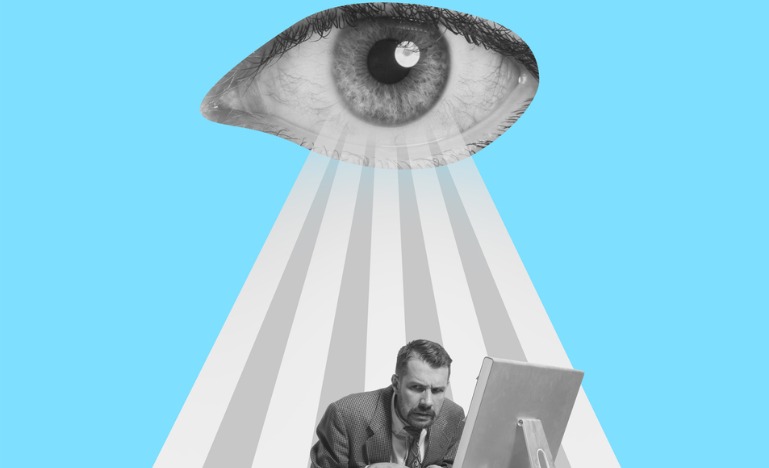Work in the age of surveillance
For legal and ethical reasons, employers ought to come clean with their employees about their reason for using monitoring software.

This month, Ontario became the first province in Canada to enact electronic monitoring legislation. The Working for Workers Act will require organizations with 25 or more employees to disclose their technology to monitor their workforce and explain how it is used. The law is likely to shine a light on the growing use of surveillance technology in the workplace.
Bill 88 passed with little fanfare earlier this year, but companies had to scramble to get ready. Under the new rules, they must publish a written policy on electronic monitoring as part of the Employment Standards Act. The law doesn't define electronic monitoring, so any software or network program that tracks employee data must be disclosed.
"There's inadvertent innocent tracking," says Lisa Stam, managing partner of SpringLaw, a boutique employment firm. "Companies are collecting data without knowing it. You have company phones, fobs, and other things that automatically collect the data. Some companies went through a cyber attack, hired someone to help, and now those new systems are collecting data. There is a huge amount of work to be done to comply with Bill 88."
All of this comes at a time when the workplace is changing. After working remotely through the pandemic, many employees are reluctant to return to the office. Last year global accounting firm PwC announced U.S. employees could work remotely from anywhere within the U.S. Meanwhile, the city of Winnipeg is rolling out a flexible work plan where employees can work hybrid or work remotely full-time.
"There's a conversation going on about how to manage employees remotely and people are trying to find software to do it," says Stam. "The problem is people are saying the way I manage this person in person is the way I want to manage them digitally. That doesn't work. We need to rethink how we manage people digitally in the workplace."
When Stam started her law firm in 2017, she decided the firm would be virtual and paperless. Her firm has grown to 14 employees, who all work remotely. "Because we're paperless, it's easy to communicate and share documents," she says. "Every morning, we say good morning to each other online. You can create a digital work culture."
Monitoring software has taken over much of our lives, from FitBits to phones counting our steps and tracking our sleep cycle. The workplace is no different. Tech companies are creating software promising workplace productivity and efficiency, but some of their programs go too far. InterGuard lets employers record and track their employees' productivity – "so you'll know if they are working hard or hardly working" – by taking screenshots of their computers every time an employee types in certain keywords. Teramind allows employers to watch employees' screens in real time, recording every keystroke.
It's the kind of software that Lauren Reid is keeping an eye on. The privacy expert says companies purchase this software without understanding the liability issues.
"We had a client using a software called Gong that records Zoom calls in the background without necessarily getting consent," says Reid. "The software promises to use AI to measure engagement in these calls." The client wanted to improve sales team performance and liberate them from having to take notes - both reasonable business practices, she says. "However, it's against the law to do this without consent in Canada, and there are states in the U.S. where they can face criminal charges for recording calls without consent. We talked to the client about risk, the likelihood of getting in trouble, and the consequences they could face. The head of sales said if I don't make tools like this available to my sales force, people will go somewhere that does. This is a complicated issue."
There are reasons to monitor employees. Reid points to tracking activities to protect people or assets, such as monitoring communications of investment brokers or security cameras in banks. The difference is employees know they're being watched and why.
In the last few years, the focus on monitoring technology has been on low-wage jobs like call centres and warehouses. Now the technology has crept into traditional white-collar jobs. An investigation from the New York Times earlier this year revealed eight out of the ten largest private companies in the U.S. use productivity software.
"These practices are a detriment to workers' well-being," says Joe Masoodi, senior policy analyst for technology, cybersecurity and democracy in the Leadership Lab at Toronto Metropolitan University. "There are excessive amounts of monitoring that may lead to high absenteeism, stress, and even physical harm like repetitive stress injuries. There can be high turnover rates and distrust in the workplace that leads to poor quality of work and deliverables."
Employees have already found ways to trick these programs into thinking they're productive using mouse jugglers like Liberty. Productivity software is increasingly used in nontraditional work settings like social workers having or hospice chaplains working with funeral homes. Employees are scored on their performance, but it's easy for software to miss offline work, such as supervising employees or simply taking a break.
"There's an impact to using this technology in our society," says Masoodi. "It impacts where we are as a democracy. What type of society are we creating? Does it align with our democratic values and principles? It may be legal to use this technology, but it does raise ethical issues. We have to maintain the dignity and autonomy of workers."
Ultimately, it's all about proportionality. Companies using monitoring software need to communicate expectations in the workplace clearly. "If you're gonna do something invasive, you have to be clear about what the goal is for using it," says Reid.
The key is to have honest, open conversations with employees to maintain trust. "If you can't talk about it, don't do it," says Reid. "If you're going to do it, tell employees. Some employers tell me if employees find out, they will find it offensive. Then maybe you shouldn't do it."


